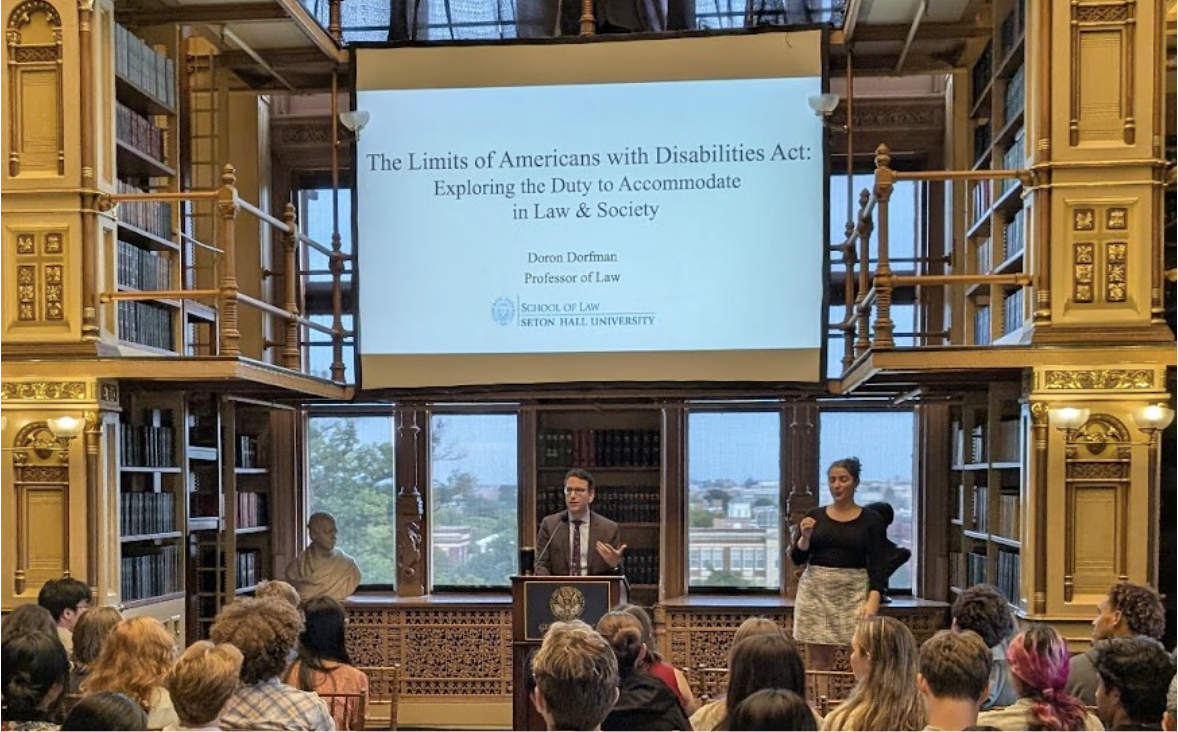The Program on the Political Economy of Latin America and the Caribbean (ProPELAC), a research group at Georgetown University’s Center for Latin American Studies, hosted a cross-disciplinary conversation on Latin American and Caribbean countries’ transition from fossil fuels to clean energy Feb. 21.
The discussion focused on challenges and opportunities for Latin American countries in their energy transitions, including ensuring economic growth and equity despite the rollback of hydrocarbons, as well as navigating geopolitical relationships with other regions of the world.
María Suarez Londoño is the president of Colombia’s branch of Banco Popular, a financial services provider. Londoño said equity considerations are just as important as innovation for a successful energy transition.
“First, we have to understand that the biggest issue in our countries is inequality,” Londoño said at the event. “It’s very hard for the people and the communities to believe, again, that there’s going to be development of a lithium mine or a fracking project and that they’re going to get the best out of it. Because they have heard that story for 50 years and that hasn’t happened.”
Latin American nations possess over 65% of the world’s reserves of lithium, demand for which tripled between 2017 and 2022 due to the element’s importance to clean energy production. Chile, additionally, is the world’s second-largest producer of lithium; however, mining operations are time- and water-intensive. They can hurt communities living near salt flats, where the extraction process takes place, by draining resources and sending contaminants into nearby ecosystems.
Londoño said simply regulating or developing clean alternatives for fossil fuels without also addressing potential consequences for disadvantaged communities can backfire.
“The problem right now is that we are getting the solution of forbidding the project instead of asking, ‘How can I make sure that, if I develop a project, people are not going to be left behind?’” Londoño said.
Carolina Ferreira is a senior consultant on critical minerals at the Inter-American Development Bank, an organization that provides financial and technical support for development in Latin American and Caribbean countries. Ferreira said the development of Chile’s first national lithium policy lacked considerations for vulnerable communities.
“It wasn’t a real priority before,” Ferreira said at the event. “I think we’ve learned from our mistake.”
Londoño said developed countries have a greater responsibility to reduce emissions due to their larger carbon footprint.
“I fully believe that we need to go at our own pace. More developed countries have to have a higher speed,” Londoño said. “The average emissions per person in North America is 14 tons of CO2. And the average per capita in Latin America is four tons per person per year.”
Marcelo Masalleras is an associate researcher at AthenaLab, a research center in Santiago, Chile, focused on foreign affairs and defense. Masalleras said the challenges of the energy transition are compounded by Latin America’s changing relationship with the United States.
“We are living in a very complicated world, and it’s gotten more complicated in the last 30 days,” Masalleras said at the event.
Osmel Manzano, an adjunct professor in the School of Foreign Service and regional economic advisor at the Inter-American Development Bank, said meaningful financial investment is key for fruitful international relationships.
“When an American diplomat arrives in a country, they arrive with a lecture. And when a Chinese diplomat arrives in a country, they arrive with a check,” Manzano said at the event.
Masalleras emphasized the need for diversified economies, pointing to the history of the saltpeter industry. Saltpeter is an impurity in salt that can be used for food preservation and gunpowder manufacturing, among other applications. It was a major wealth generator for Chile until alternatives were developed in Europe during the early 20th century, sending shockwaves through the Chilean economy and leaving once-flourishing mining towns deserted.
Masalleras said history could repeat itself if Latin American and Caribbean countries become too dependent on resource extraction.
“Somebody will create something better than lithium and copper,” Masalleras said.
The conversation concluded with a discussion on green hydrogen and the success story of Uruguay. Hydrogen is an emerging clean alternative to oil and natural gas because it releases only water, not carbon dioxide, when it is burned. Green hydrogen takes the solution a step further by using electricity from renewable sources to split water molecules and extract hydrogen.
Londoño said Uruguay, which runs on 98% renewables, may face challenges if climate change impacts its renewable energy sources.
“It has done a tremendous job,” Londoño said. “However, its power generation has a high dependence on hydrogen. And Latin America is one of the regions that’s more vulnerable to climate change. So if we have a period where we lack rain, the reliability of that power generation is still to be proven.”
Londoño added that she believes a key explanation for Uruguay’s success is its commitment to narrowing inequality alongside cleaning up its energy production.
“Uruguay has been able to close the inequality gap in a more successful way than other countries,” Londoño said. “We cannot talk about the energy transition without thinking about that inequality and the social conditions.”




